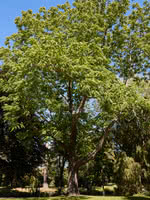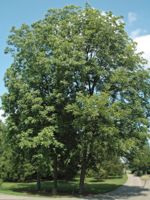Mon-Fri 9am - 5pm Mountain time
Black Walnut vs Hardy Pecan
Juglans nigra
Carya illinoinensis
NOT AVAILABLE THIS SEASON - MIGHT RETURN
NOT AVAILABLE THIS SEASON - MIGHT RETURN
The Black Walnut is a slow growing, large, straight-stemmed tree with an open crown. It produces dense, very hard, edible nuts.
Black Walnut has a deeply-furrowed, black bark. Its leaves are about 1 foot long, composed of 15 - 23 slightly stalked leaflets on a moderately stout stock which provide good dappled shade.
Despite being highly valued for its edible nuts and its shade tree aesthetics, it is rare to see this tree on the prairies.
Note: Black Walnut's roots produce a substance named juglone that is toxic to some other plants. Consider this when choosing where you plant a black walnut, as you will not be able to grow tomato, potato, cabbage, eggplant, blueberry, azalea, rhododendron, lilac, red pine and apple in the surrounding area.
Note: Plant this tree once. It will not respond well to transplanting.
Note: Although self-pollinating, planting two trees significantly improves nut production.
Hardy Pecan trees are known for their edible nuts that ripen in late autumn. They can be eaten raw or cooked and can be used in a wide range of baked goods. If stored properly in a cool, dry location, they can be kept for up to 6 months in their shell. Trees tend to bear nuts at maturity, which occurs around 6 -10 years. The size and form of this tree also makes it a great shade or feature tree for your landscape.
For nut production, it is recommended that at least 2-3 are planted so that cross pollination can occur. In colder areas it is likely that nut production will be limited, especially in locations with late frosts and shorter growing seasons.
If exposed to high winds, Hardy Pecan is known to lose branches, but these can be used as firewood, or to smoke foods with a hickory flavour. Finding seed or seedlings of this tree is rare in Canada.
Note: plant this tree once. It will not respond well to transplanting.

